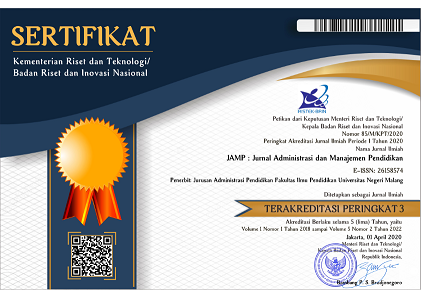NURSING EDUCATION RESILIENCE: THE EFFECTIVE STRATEGIES TO ADDRESS THE CHALLENGES OF STAKEHOLDERS DURING THE COVID-19 PANDEMIC
Abstract
Abstract: The complexity of the challenges for nursing education makes the nursing study program think hard to produce various innovations in curriculum implementation during the COVID-19 pandemic. This study aims to explore the strategy of the nursing undergraduate study program in implementing a nursing curriculum that is oriented to stakeholder demands during the COVID-19 pandemic. This study uses a qualitative approach, using interpretive phenomenological methods. Purposive and snowball sampling was used in this study to help the researchers identify the key informant, with the criteria: ten nursing lecturers who are active in giving lectures in the COVID-19 pandemic, twenty stakeholders (among them: students, nursing clinical instructors, clinical professional nurses, users of nursing graduates) and willing to be an informant. Using semi-structured interview techniques, the data obtained is then analyzed using the interactive analysis model of Miles, Huberman & Saldana. The results found five themes, including (1) Increase collaboration with instructors from the clinic; (2) Strengthening the skills of teachers with the blended learning method; (3) Streamline the learning management system; (4) Develop community-based nursing learning during pandemic; (5) Open-effective communication with stakeholders. The effectiveness of the curriculum implementation strategy during the COVID-19 pandemic requires pro-activity from the entire academic community of the nursing study program, to produce quality nursing graduates and meet the high demands of stakeholders during the multi-crisis of the COVID-19 pandemic. The success of the nursing education curriculum system during the COVID-19 pandemic is strongly influenced by the active and positive contributions and collaborations of nursing stakeholders.
Keywords: COVID-19 pandemic; curriculum strategies; nursing education; resilience; stakeholders challenges.
Full Text:
PDFReferences
Aini, I. N. (2021). ICT in ESP Using Blended Learning and The Students’ Motivation: A Literature Review. Jurnal Ilmiah Edukasi & Sosial, Volume 12, No. 1, March 2021, pg. 30–34.
Akbas, M. (2019) ‘Ethics in Nursing Education from the Viewpoints of Turkish Nursing Educators ’, (December 2017). doi: 10.1080/09751122.2017.1397435.
Bafadal, M. R., Roesminingsih, E. and Sumbawati, M. S. (2022) ‘Implementasi kepemimpinan pembelajaran untuk mewujudkan mutu sekolah’, JAMP: Jurnal Adminitrasi dan Manajemen Pendidikan, 5(2015), pp. 77–86.
Beltz, S. K. et al. (2020) ‘Innovations in nursing education: recommendations in response to the COVID-19 pandemic’, The National Education Progression in Nursing Collaborative (NEPIN), p. 8.
Bhebe, S. V and de la Harpe, R. (2014) ‘Nursing Informatics Education Stakeholder Analysis in South Africa’, (December), pp. 1–5.
Budiman et al. (2019) ‘Strategi Peningkatan Akademi Keperawatan untuk Mempersiapkan Lulusan Bermutu (Studi pada Akademi Keperawatan Pemerintah Kabupaten Garut dan Akademi Keperawatan Pemerintah Kabupaten Sumedang)’, Kajian Manajemen Pendidikan, 2, pp. 105–116.
Bvumbwe, T. and Mtshali, N. (2018) ‘Nursing education challenges and solutions in Sub Saharan Africa: An integrative review’, BMC Nursing, 17(1), pp. 1–11. doi: 10.1186/s12912-018-0272-4.
Desimone, B. B. (2016) ‘Curriculum Design to Promote the Ethical Decision-Making Competence of Accelerated Bachelor ’ s Degree Nursing Students’. doi: 10.1177/2158244016632285.
Desimone, B. B. (2019) ‘Curriculum Redesign to Build the Moral Courage Values of Accelerated Bachelor ’ s Degree Nursing Students’, SAGE Open Nursing, 5, pp. 1–10. doi: 10.1177/2377960819827086.
Escolar-llamazares, M. (2020) ‘Effectiveness of Blended Learning in Nursing Education’, International Journal of Environmental Research and Public Health.
Fanani, Q. and Jainurakhma, J. (2021) Penyesuaian Diri : Pembelajaran Daring di Masa Pandemi COVID-19. Malang: Literasi Nusantara.
Hamdani, A. (2020) ‘Plus Minus Coaching Daring Kolektif Pada Latsar CPNS’, Jurnal Sipatokkong BPSDM Sulawesi Selatan, 1(4), pp. 276–281.
Harrison, H. et al. (2019) ‘determine practice readiness of newly graduated registered nurses’, Collegian. doi: 10.1016/j.colegn.2019.07.003.
Haryanti, F. et al. (2016) Kurikulum Inti Pendidikan Ners Indonesia. Edited by F. Haryanti et al. Jakarta: Asosiasi Institusi Pendidikan Ners Indonesia (AIPNI).
Izzah, N. et al. (2018) ‘The Improvement of Caring Behavior among Nurses through Nursing Leadership Based on the Emotional Intelligent’, Open Access Library Journal, 5, pp. 1–9. doi: 10.4236/oalib.1104466.
Jainurakhma, J. et al. (2020) ‘Lived experience of nurses in caring for persons with out-of-hospital cardiac arrest in rural areas of East Java Indonesia: A phenomenological study’, Belitung Nursing Journal, 6(2), pp. 47–51. doi: 10.33546/BNJ.1075.
Jainurakhma, J., Damayanti, D., et al. (2021) Caring Perawat Gawat Darurat. Yayasan Kita Menulis.
Jainurakhma, J., Imron, A., et al. (2021) ‘Nursing “ new normal ” education : an investigation of barriers and strategies of curriculum planning to meet national standards’, Bali Medical Journal, 10(3), pp. 1152–1160. doi: 10.15562/bmj.v10i3.2835.
Jamal, S. (2020) ‘Analisis Kesiapan Pembelajaran E- Learning Saat Pandemi COVID-19 di SMK Negeri 1 Tambelangan’, Jurnal Nalar Pendidikan, 8(1), pp. 16–22.
Kadioglu, M., Tacgin, Z. and Sahin, N. (2020) ‘Instructional design and material development progress to e-learning environments: A sample of obstetrical nursing education’, Contemporary Educational Technology, 12(1), pp. 1–11. doi: 10.30935/cedtech/7631.
Li, Q. et al. (2017) ‘Global health education in Chinese universities and potential for collaboration with schools of nursing: A qualitative study’, International Journal of Nursing Sciences, 4(1), pp. 12–18. doi: 10.1016/j.ijnss.2016.12.001.
Maniago, J. D., Albougami, A. S. and Orte, C. J. S. (2020) ‘Stakeholders Quality Framework of Nursing Education : A Brief Report Stakeholders ’ Quality Framework of Nursing Education : A Brief Report’, (May).
Mansyur, A. R. (2020) ‘Dampak COVID-19 Terhadap Dinamika Pembelajaran Di Indonesia’, Education and Learning Journal, 1(2), p. 113. doi: 10.33096/eljour.v1i2.55.
Mikkonen, K., Vuopala, E. and Ka, M. (2019) ‘Effects of a digital educational intervention on collaborative learning in nursing education : A quasi-experimental study’, 0(0), pp. 1–10. doi: 10.1177/2057158519861041.
Naseem, A. et al. (2020) ‘Factors enabling and hindering an eLearning programme for nurses and midwives in Afghanistan’, SOTL in the South, 4(2), pp. 80–99. doi: 10.36615/sotls.v4i2.106.
Numminen, O., Repo, H. and Leino-Kilpi, H. (2017) ‘Moral courage in nursing: A concept analysis’, Nursing Ethics, 24(8), pp. 878–891. doi: 10.1177/0969733016634155.
Nurhayati (2018) ‘Model Peningkatan Perilaku Caring pada Mahasiswa Jurusan Keperawatan Politeknik Kesehatan Kemenkes Pangkalpinang’, 9(2), pp. 225–232.
Parson, L., Childs, B. and Elzie, P. (2018a) ‘Using Competency-Based Curriculum Design to Create a Health Professions Education Certificate Program that Meets the Needs of Students, Administrators, Faculty, and Patients’, Health Professions Education. doi: 10.1016/j.hpe.2018.03.008.
Parson, L., Childs, B. and Elzie, P. (2018b) ‘Using Competency-Based Curriculum Design to Create a Health Professions Education Certificate Program the Meets the Needs of Students, Administrators, Faculty, and Patients’, Health Professions Education, 4(3), pp. 207–217. doi: 10.1016/j.hpe.2018.03.008.
Pickles, D., King, L. and de Lacey, S. (2017) ‘Culturally construed beliefs and perceptions of nursing students and the stigma impacting on people living with AIDS: A qualitative study’, Nurse Education Today, 49. doi: 10.1016/j.nedt.2016.11.008.
Pollock, A. et al. (2018) ‘Stakeholder involvement in systematic reviews: A scoping review’, Systematic Reviews, 7(1), pp. 1–26. doi: 10.1186/s13643-018-0852-0.
Popadynets, I. et al. (2020) ‘The effect of cooperation between universities and stakeholders: Evidence from Ukraine’, International Journal of Data and Network Science, 4(2), pp. 199–212. doi: 10.5267/j.ijdns.2020.1.001.
Prawatiningsih, D. and Asia, N. (2022) ‘Kualitas Pembelajaran E-Learning Berdasarkan Persepsi Mahasiswa’, JAMP: Jurnal Adminitrasi dan Manajemen Pendidikan, 5(1), pp. 25–35.
Saleh, M. (2020) ‘Merdeka Belajar” di Tengah Pandemi COVID-19’, Prosiding Seminar Nasional Hardiknas, 1, pp. 51–56. Available at: http://proceedings.ideaspublishing.co.id/index.php/hardiknas/article/view/8.
Santosa, A. B. (2022) ‘Principal’s Leadership Strategy In The Development Of Teacher Professionalism’, JAMP: Jurnal Adminitrasi dan Manajemen Pendidikan, 5(2), pp. 1–7.
Slack, C. B., Cliffs, E. and Slevin, A. P. (2006) ‘Maintaining the ethic of caring in nursing’, Journal of Advanced Nursing, (1981), pp. 1981–1983.
Steward, I. A. (2016) ‘The importance of professional education preparation for nursing faculty.’, Importance of Professional Education Preparation for Nursing Faculty. Available at: http://www.mendeley.com/research/importance-professional-education-preparation-nursing-faculty.
Sugiarto, A. (2020) ‘Dampak Positif Pembelajaran Online Dalam Sistem Pendidikan Keperawatan Pasca Pandemi COVID 19’, Jurnal Perawat Indonesia, 4(3), p. 432. doi: 10.32584/jpi.v4i3.555.
Triwijayanti, R. and Rahmania, A. (2019) ‘Analisis Kepuasan Stakeholder terhadap Kinerja Perawat Lulusan PRODI D III Keperawatan’, Sekolah Tinggi Ilmu Kesehatan Muhammadiyah Palembang, 7(2), pp. 352–356.
Virgolesi, M. et al. (2015) ‘Stakeholders in Nursing Education: Their role and involvement’, Annali di igiene: medicina preventiva e di comunità, (July 2018), pp. 559–569. doi: 10.7416/ai.2014.2015.
Virgolesi, M. et al. (2019) ‘Stakeholders ’ perspective about their engagement in developing a competency-based nursing baccalaureate curriculum : A qualitative study’, Journal of Professional Nursing, (March), pp. 1–6. doi: 10.1016/j.profnurs.2019.09.003.
Wianti, A. et al. (2021) ‘Kararkteristik dan Budaya Keselamatan Pasien terhadap Insiden Keselamatan Pasien’, Jurnal Keperawatan Silampari, 5(1), pp. 12–26. doi: https://doi.org/10.31539/jks.v5i1.2587.
Widiasari, W., Handiyani, H. and Novieastari, E. (2019) ‘Kepuasan Pasien Terhadap Penerapan Keselamatan Pasien Di Rumah Sakit’, Jurnal Keperawatan Indonesia, 22(1), pp. 43–52. doi: 10.7454/jki.v22i1.615.
Wulandari, E. (2020) ‘Gambaran Kepuasan Stakeholder terhadap Kinerja Alumni Program Studi Keperawatan Universitas Muhammadiyah Surakarta’, Sustainability (Switzerland), 4(1), pp. 1–9.
Yamin, M. and Syahrir, S. (2020) ‘Pembangunan Pendidikan “Merdeka Belajar” (Telaah Metode Pembelajaran)’, Jurnal Ilmiah Mandala Education, 6(1), pp. 126–136. doi: 10.36312/jime.v6i1.1121.
DOI: http://dx.doi.org/10.17977/um027v5i22022p105
Refbacks
Copyright (c) 2022 Janes Jainurakhma, Inu Martina, Sekarini Sekarini, Qori Fanani, Indah Nur'aini

This work is licensed under a Creative Commons Attribution-ShareAlike 4.0 International License.


This work is licensed under a Creative Commons Attribution-NonCommercial-ShareAlike 4.0 International License.










12.png)